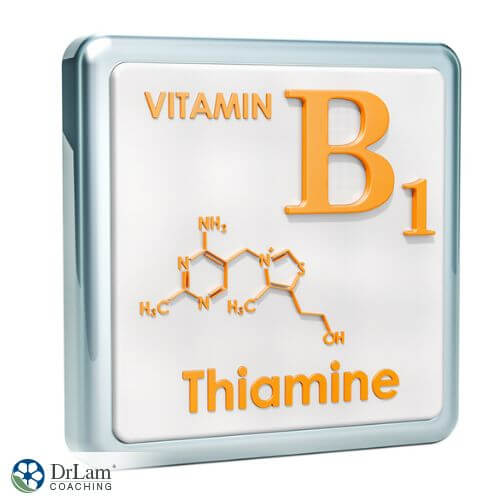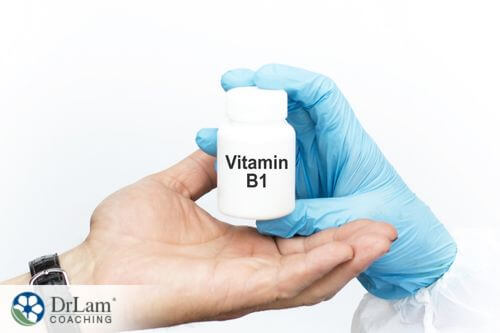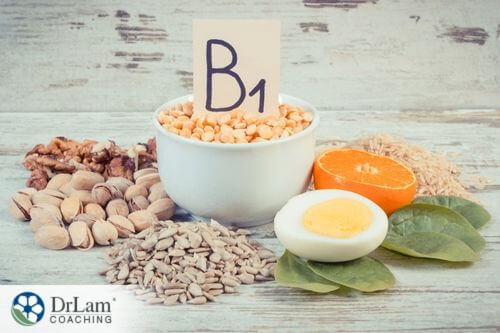Vitamin B1 was the first B vitamin to be isolated by scientists back in 1926. Today, about a century later, the vitamin has garnered a lot of medical research interest. Scientists have recently uncovered a possible link between vitamin B1 and migraines. But what is the basis for this link, and does it really work? Let’s find out.
 Vitamin B1, also known as thiamin, is one of the most important vitamins in the body, as it helps convert food into energy. However, aside from the production of ATP (adenosine triphosphate), the unit of energy in the body, scientists have found some other medical benefits of vitamin B1 as well.
Vitamin B1, also known as thiamin, is one of the most important vitamins in the body, as it helps convert food into energy. However, aside from the production of ATP (adenosine triphosphate), the unit of energy in the body, scientists have found some other medical benefits of vitamin B1 as well.
A study of nearly 13,500 individuals showed that thiamin is associated with a reduced risk of migraines. Characterized by moderate or severe headaches felt as a throbbing pain on one side of the head, migraines are a common health condition. Migraines affect more than 10% of people worldwide and are three times more common in women.
Although the study suggests thiamin can be used in managing migraines, it fails to fully explain the vitamin’s role in reducing the frequency of migraine attacks, especially in women. Also, the study has some significant limitations. For one, the analysis techniques the study employed have a rather high risk of error. Again, the study cannot show that a deficiency of vitamin B1 causes migraines, and doesn't merely occur at the same time. Lastly, the mode of data collection was self-reporting from sampled individuals, which also increased the risk of error.
However, some experts believe the role of vitamin B1 in preventing migraines is due to its effects on serotonin, a neurotransmitter needed for the brain and nerve cells to survive. Thiamin has been found to regulate the levels of serotonin in the brain. Since various studies have implicated serotonin in the pathogenesis of migraines, thiamin may help prevent migraines indirectly.
On the other hand, a different study found that there was no correlation between the frequency of migraine attacks and vitamin B1 intake. While the study showed that patients with a high frequency of migraine attacks had a far lower vitamin B1 intake compared to those with a moderate frequency of attacks, there was no significant difference after considering the energy intake of the two groups.
There is a need for more scientific studies before medical experts can make a definitive claim about managing migraines with thiamin. Notwithstanding, vitamin B1 remains a promising management option for migraines and severe headaches.
Vitamin B2 (riboflavin) has long been used to manage migraine headaches, especially in high doses. Although this vitamin has proven to be safe and well-tolerated among migraine patients, there is insufficient evidence that it reduces the frequency or severity of migraine attacks.
Interestingly, from the study that sampled over 13,500 individuals over five years, there was no significant decrease in the frequency or severity of migraine attacks by vitamin B2. Conversely, the study found that vitamin B1 could reduce the frequency of migraine attacks by up to 7%.
While this study favors vitamin B1, it is not enough to make a bold claim about which is better for managing or preventing migraines. Both vitamins are well tolerated and safe for migraine patients, and they both have a similar shortcoming of insufficient research. More studies on both vitamins and their role in managing migraines are necessary before a conclusive answer can be provided.
 Vitamin B1 is generally well-tolerated and safe, and no evidence or reports from the FDA indicate any harm from taking the vitamin. Still, not everyone should use vitamin B1 supplements.
Vitamin B1 is generally well-tolerated and safe, and no evidence or reports from the FDA indicate any harm from taking the vitamin. Still, not everyone should use vitamin B1 supplements.
According to the NHS, children under 12 should only use thiamin if a specialist recommends it. Also, individuals that have demonstrated an allergy to thiamin in the past or that are due for a blood scan should only take the vitamin on the recommendation of their health practitioner.
Individuals on the following medications should also get in touch with their health practitioner before using vitamin B1 supplements:
It is also worth noting that the FDA does not apply the stringent regulations on drugs to supplements. As such, there is always the risk of false reporting on labeling and flat-out substandard products. Therefore, it is advisable to get supplements from only reputable brands and stores.
While the most typical medical benefits of vitamin B1 are energy production and the prevention of migraines, thiamin is also a potential management option in certain conditions. Below are some of the other medical benefits of thiamin:
Peripheral neuropathy is a disorder that develops when peripheral nerves in the body’s extremities, usually the hands and feet, are damaged. This disorder often causes weakness, numbness, and pain in the hands and feet. One of the health conditions that cause peripheral neuropathy is chronic inflammation.
Aside from peripheral neuropathy, chronic inflammation can also cause severe disorders, like Adrenal Fatigue Syndrome (AFS), which occurs when the body’s stress response cannot cope with life’s chronic stressors. This syndrome results when there is a dysregulation of the inflammation circuit of the NeuroEndoMetabolic (NEM) Stress Response. The NEM system is concerned with managing stress in the body and comprises six circuits, encompassing several organs and systems in the body.
Studies show that thiamin can inhibit cytokine production and reduce the number of proinflammatory mediators in the body. This can help resolve inflammation in the body, thereby assisting in the management of peripheral neuropathy and adrenal fatigue. Additionally, thiamin can improve the body’s ability to manage stress, which further helps in adrenal fatigue.
There are links between a deficiency of vitamin B1 and depression. This may be because of the role of the vitamin in regulating the vital mood neurotransmitter – serotonin. While vitamin B1 is not an antidepressant, nor should it replace one, the combination of the vitamin with other antidepressants has consistently shown encouraging results.
Thiamin can lower the risk of heart conditions through its role in synthesizing an important neurotransmitter in the parasympathetic nervous system, acetylcholine. This neurotransmitter helps dilate blood vessels and slows the heart rate. Thiamine is a cofactor in acetylcholine synthesis, and a thiamine deficiency will result in reduced acetylcholine production, which can result in several heart conditions.
Again, vitamin B1 should not replace heart medications but could complement them. Also, people on heart medications should contact their healthcare provider for approval before using the vitamin as a supplement.
 Thiamin is a critical vitamin for normal body function. However, the body cannot produce it and relies on getting the vitamin from dietary sources. Fortunately, thiamin is readily available in many foods and fruits, including the following:
Thiamin is a critical vitamin for normal body function. However, the body cannot produce it and relies on getting the vitamin from dietary sources. Fortunately, thiamin is readily available in many foods and fruits, including the following:
These foods can be incorporated into your daily diet to increase thiamin intake.
While most people get all of the thiamin they need from food, some people need supplements to meet their thiamin needs. Usually, the dose is between 25 and 100mg two to three times daily.
Thiamin is a generally safe supplement. Even excess levels from supplements are unlikely to harm adults or children. However, speaking to your health practitioner before using the supplement is still key to avoiding any unwanted interaction or adverse effects.
Some of the side effects associated with thiamin use include:
These symptoms usually resolve within a few days, but if they don’t, ensure you get in touch with your healthcare provider. Furthermore, chemicals in tea, coffee, and raw fish can interfere with thiamin and lead to a deficiency.
Vitamin B1 (thiamin) is a water-soluble vitamin freely found in the diet of most people. This vitamin is important in energy production in the body, and studies have shown that it can also help reduce the frequency and severity of migraine attacks. While there is a need for more studies before experts can make any definitive medical claim about thiamin, initial results are promising.
Thiamin is also crucial in managing chronic inflammation, heart conditions, and depression. Although thiamin supplements are common in stores, it is essential to consult with your healthcare provider before commencing supplement use.
For more information about the uses of this vitamin and other ways to prevent migraines, the team at Dr. Lam Coaching can help. We offer a free, no-obligation phone consultation at +1 (626) 571-1234 where we will privately discuss your symptoms and various options. You can also send us a question through our Ask The Doctor system by clicking here.
Vitamin B1 is a generally safe and well-tolerated vitamin for anyone over 12. In fact, an excess of the vitamin will not harm adults or even children. However, below age 12, this vitamin supplement should only be given at the recommendation of your child's doctor.
